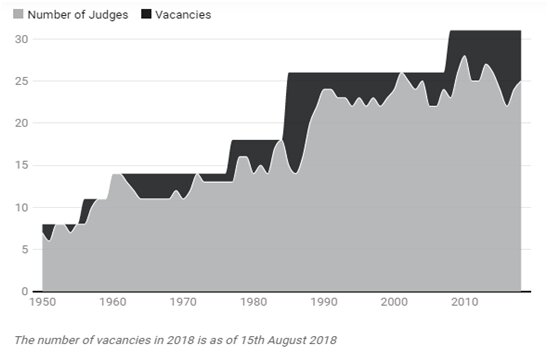Indian Polity
Supreme Court’s Strength
- 10 May 2019
- 3 min read
Recently, the Supreme Court Collegium recommended the names of four judges separately, to be elevated to the Supreme Court, out of which the government disapproved the elevation of two judges (Jharkhand High Court Chief Justice Aniruddha Bose and Gauhati High Court Chief Justice A.S. Bopanna).
However, the Collegium refused to reconsider its recommendation and resent the file to the government for final approval.
If the four judges are elevated, the Supreme Court would reach the full sanctioned strength of 31.
Strength of Supreme Court
- The original Constitution of 1950 envisaged a Supreme Court with a Chief Justice and 7 puisne Judges - leaving it to the Parliament to increase this number.
- As the work of the Court increased and arrears of cases began to cumulate, the Parliament increased the number of Judges from 8 in 1950 to 11 in 1956, 14 in 1960, 18 in 1978 and 26 in 1986.
- In February 2009, the number of Supreme Court judges increased from 26 to 31, including the Chief Justice of India.
- However, strength of Supreme Court is rarely full due to the following reasons:
- Difficulty in finding judges
- Courts’ mandatory retirement ages: High Court judges retire at the age of 62, and Supreme Court judges at 65, which, by global standards, are low retirement ages. In the UK, Supreme Court judges retire at 75, in Australia at 70 and in the US, there is no mandatory retirement age. Low retirement ages create short tenures and frequent vacancies.
Supreme Court is Rarely Full
What is Collegium System?
- The Collegium System is a system under which appointments/elevation of judges/lawyers to the Supreme Court and transfers of judges of the High Courts are decided by a forum of the Chief Justice of India and the four senior-most judges of the Supreme Court.
- The Collegiums System of appointment of judges finds its genesis from the “Three Judges Case, 1998”.
- The Central Government may require the Collegium to reconsider its recommendations only once, as the recommendations are binding on the Central Government if the Collegium sends the names of the judges/lawyers to the government for the second time.







